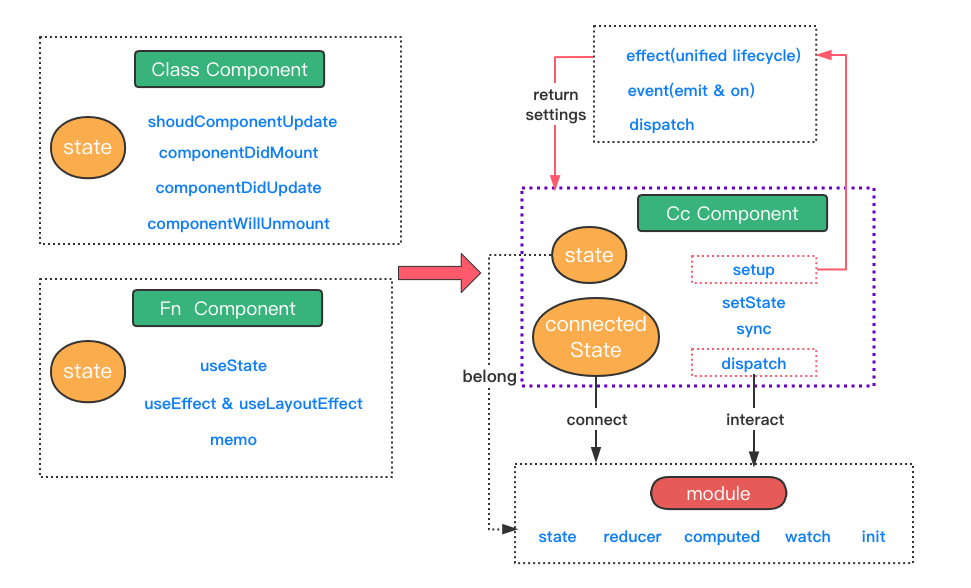What can Concent offer you
simple core api
use 'run' to load model configuration, use 'register' to decorate class component, or use 'useConcent' to decorate function component.
zero-cost-use
no [Provider] any more, the decorated component can be interactive with store by [setState] directly.
friendly model configuration
except state, you can also define reducer、computed、watch and init optionally to cover all your scene.
flexible data consumption granularity
your can consume multi model data with state key level dependency.
progressive
except setState, you can also use dispatch or invoke to change state, separate your business logic and ui completely.
enhance component ability
support ref level computed 、watch、emit&on、setup etc.
highly consistent coding experience
no matter class component or function component, they can enjoy the same api call.
high performance rendering mechanism
working based on dependency mark、ref collection and state broadcast,built-in renderKey、lazyDispatch、delayBroadcast feature.
clean dom hierarchy
use reverse inheritance strategy for class component by default, to let your react dom tree keep clean.
middleware and plugin is supported
allow user customize middleware to intercept data changing behavior to do something else, allow user customize plugin to enhance concent ability.
de-centralization model configuration
allow user call configure api to configure you model definition, that means you can publish your component to npm with model.
model clone
allow user clone new model by existed model, to meet the abstract factory need.
How to install
npm install concent --save
//or
yarn add concentKey features preview
❤️Enjoy composition api with 🔥dependency collection🔥import { run, useConcent } from "concent";
run();// startup concent
const setup = ctx => {
const { initState, computed, watch, setState } = ctx;
// init ref state
initState({ count: 0 });
// defined a computed fn, here dep is count,
// only count value changed will trigger this computed fn execute again
computed("doubleCount", n => n.count * 2);
// defined a watch fn, here dep is count,
// only count value changed will trigger this watch fn execute again
watch("count", (n, o) => alert(`from ${o.count} to ${n.count}`));
// return packed methods, they will been collected to ctx.settings
return {
inc: () => setState({ count: ctx.state.count + 1 }),
dec: () => setState({ count: ctx.state.count - 1 })
};
};
function Counter(){
// deconstruct from ref ctx
const { state, refComputed, settings } = useConcent({ setup });
return (
<>
<h1>{state.count}</h1>
<h1>{refComputed.doubleCount}</h1>
<button onClick={settings.inc}>inc</button>
<button onClick={settings.dec}>dec</button>
</>
);
}
❤️Easily share state and reuse logic between class and function
import { run, useConcent } from "concent";
const delay = (ms = 1000) => new Promise(r => setTimeout(r, ms));
run({// startup concent with module configuration counter: {
state: { count: 0 },// 【neccessary】,define module state
reducer: {
async complexUpdate(p, m, ac) {
await delay();
await ac.setState({ count: m.count + 10 });
await delay();
return { count: m.count + 10 };
},
simpleUpdate(p, m) {
return { count: m.count - 100 };
}
},
computed: {// 【optional】,define module computed
doubleCount: n => n.count * 2,
quadrupleCount: (n, o, f) => f.cuVal.doubleCount * 2,
},
watch: {// 【optional】,define module watch
count: (n, o) => alert(`from ${o.count} to ${n.count}`)
}
}
});
const setup = ctx => {
return {
inc: () => ctx.setState({ count: ctx.state.count + 1 }),
dec: () => ctx.setState({ count: ctx.state.count - 1 })
};
};
function Counter() {
const { state, moduleComputed, moduleReducer, settings } =
useConcent({ setup, module: "counter" });
return <div> ui ... </div>
}
@register({ setup, module: "counter" })
class ClassCounter extends React.Component{
render(){
const { state, moduleComputed, moduleReducer, settings } = this.ctx;
return <div> ui ... </div>
}
}
Experience standard js concent project
Experience standard ts concent projectExplore more





